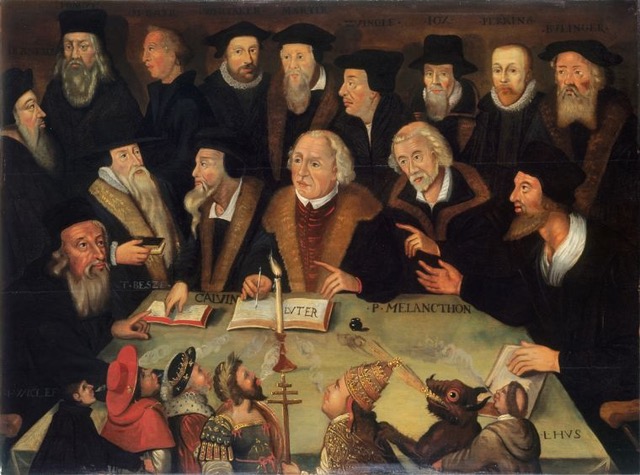My faith journey has been an unusual one. I say this because, judging from dozens of friends and acquaintances around the country, it is uncommon for a person raised with conservative values and politics, as I was, to swerve from that ethos to something else.
Why is it unusual? Because in the mind of the devout, one’s closely held values and beliefs are identical to God’s will. If I change my mind, they would say, I would be turning my back on God.

Dinosaurs in the Garden of Eden
I encountered this one day when, after a 40-minute conversation, I came very close to talking someone into embracing mainstream geological science regarding the age of the earth (as 4.5 billion years old) over the view of biblical literalism, which holds that the earth is only about 10,000 years old.
“I see what you’re saying, and it makes sense,” she said. “But if I accepted that, I’d feel like I was denying God.”
Perhaps it’s not so uncommon to morph from one brand of conservatism to another, for example, from Southern Baptist Dispensational ideas to Reformed Theology.
In the late 90s, like many non-denominational and Bible church types, I learned about the Presbyterian Church in America, or PCA. It held out the frothing cup of rigorous intellectual faith: the awkward, unfamiliar doctrines of infant baptism, covenant theology, and the Regulative Principle. And, of course, the particular bug-a-boo doctrine of predestination.
One of the hardest concepts in predestination is that God created millions and millions of souls for no other purpose than to condemn them; they have no chance for salvation. They are created and predestined by God’s loving plan for eternal, conscious, flesh-burning, face-melting, writhing-in-torturous-shrieking punishment for trillions and trillions of years after death. They are marked out for damnation before the foundation of the earth. And God somehow derives glory and praise out of this sick, abominable idea.
 For a Baptist to embrace predestination—the idea that God has planned, foreordained, and executed ALL THINGS with complete unilateral sovereignty—is to undergo a supposedly healthy submission and conquest of the mind and will to the supposed teachings of scripture.
For a Baptist to embrace predestination—the idea that God has planned, foreordained, and executed ALL THINGS with complete unilateral sovereignty—is to undergo a supposedly healthy submission and conquest of the mind and will to the supposed teachings of scripture.
Now, to someone who loves God and wants more, someone who has a burning heart for the deeper life of the faith, someone who dreams of being called to suffering and persecution and, if God wills it, even martyrdom that he may endure pain for the Lord he or she loves, a doctrine like predestination seems especially well-adapted to tame the undomesticated ego.
Students of predestination and reformed theology are told that, yes, these ideas are challenging to the will and the intellect. But isn’t that what we would expect? Do you want access into the deeper riches of the theological treasure trove, or not? If so, this is the price. Lay down your qualms and your objections, and everything in your heart that insists otherwise. Those are only leftovers of your fleshly nature that you were born with. Taste the juicy ribeye of Calvinism and leave behind the milky teat of revivalist evangelical salvationism.
I wanted access to this venerable club of scholars and theologians, so I ate the steak.
Infant baptism and Covenant Theology—those were just new ideas that took some getting used to. Raised in a church where “believer’s baptism” was regularly practiced, baptizing babies who could not make a personal profession of faith seemed a violation. “Babies cannot profess faith! They cannot pray to ask forgiveness for their sins! How then can they be baptized?”

But given enough time, I learned to stop seeing baptism as a rung on the ladder of soul conversion and more as an ancient communal rite that doesn’t rely on the will of the infant. Parents do things to provide for their infants’ welfare every day. Why should their spiritual welfare be any different?
So, it’s not uncommon to transmogrify from a less rigorous form of conservative theology to another more rigorous one.
But, back to my point, how does one ever find a way out of these hot houses of conservative Christian doctrine to something else? And does forsaking conservatism mean espousing liberalism, whatever that is?
No. Liberal theology can be just as wonky and unbiblical as conservative theology.
(I am speaking as if we all understood what conservatism and liberalism are anyway. I don’t have time right now to define them.)
I am only pointing out that when people have held certain views their whole lives, they are held in those camps by a powerful force called fear—literal fear of God. And isn’t that supposed to be a good thing? Doesn’t scripture teach us to fear God?
What a minefield this is.
So, how does one leave the conservative theological world for good? I’ll discuss that in a future post.








Eager for part 2!
Curious to read part 2
what a cliff hanger.